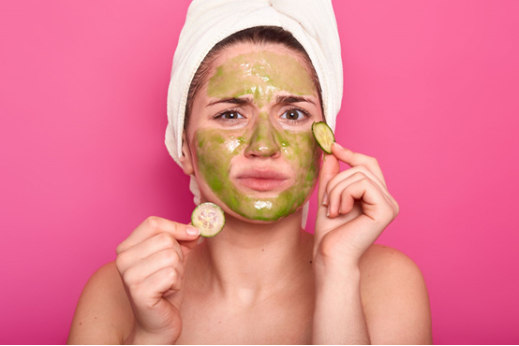|
Most of us are all about do-it-yourself everything. Because it’s about saving money. Unfortunately, do-it-yourself skincare could be dangerous. Using natural ingredients could cause adverse side effects. Thank goodness board-certified dermatopathologist Dr. Gretchen Frieling reached out to us about this dangerous trend. Are you guilty of these skincare DIYs? Toothpaste for acne spots Treating pimples with toothpaste is backed by many who have extolled its drying properties. While it can dry the pimple out, Dr. Frieling explains, "It can also cause irritation, redness, and even peeling." The chemical and ingredients in toothpaste that fight bacteria are made for your teeth, not your skin! Crack Wise-dom: Guilty. We like to feel the burn. Makes us realize we’re alive. BURRRN! Citric acid (lemons and limes) as toners You may have seen DIY exfoliators or toners featuring lemon juice as an ingredient -- but you should really avoid putting this on your face. Dr. Frieling shares, "Because of its high acidity, lemon juice can disrupt the natural pH levels of your skin leading to irritation and hyperpigmentation." Crack Wise-dom: Not Guilty. We prefer our citrus in drinks. Like a rum and coke, while doing a DIY skincare routine. Rubbing alcohol to dry acne At the crux of germ-fighting products, rubbing (isopropyl) alcohol cleans wounds, disinfects, and sanitizes the skin. You think it would be great for your face too, right? Think again! "Repeated exposure to isopropyl alcohol on the face strips the skin of its natural protective barrier, oils, and irritates the skin." shares Dr. Frieling. While rubbing alcohol works great to remove bacteria, it's not always what is causing acne breakouts. Crack Wise-dom: Guilty. See the above “feel the burn”. No, we don’t have an issue. Don’t judge. Baking soda as an exfoliator Baking soda is an alkaline, meaning it attempts to neutralize acidity. When it comes to healthy skin, Dr. Frieling says it should have a pH level of around 5.5. "Baking soda (a pH of 9) can alter the outer layer of skin and actually cause it to break down," she adds, "leaving the skin vulnerable to bacteria and worsening the condition." Crack Wise-dom: Not Guilty. The only baking soda we have is the 10-year-old box in the fridge. Pretty sure it needs to stay there. Raw eggs in your face mask Anyone tell you not to eat raw eggs? Claims of salmonella and stomach issues would persuade you against it, but what about your face? While egg whites are definitely the cheaper alternative to most serums, Dr. Frieling says it should not go anywhere near your face. "If you have a scratch or unhealed blemish on your face, putting raw egg whites on your face can cause infection, not to mention possible allergic reactions," she explains. Crack Wise-dom: Not Guilty. Eggs are meant to be scrambled with cheese and devoured. Coconut oil as a moisturizer or cleanser It's excellent for food, hair, and even the legs, but coconut oil needs to stay far away from your face. Some claim it does wonders for their skin, making it brighter and smoother, others not so much. "Coconut oil is extremely comedogenic," says Dr. Frieling "it can't be absorbed into the skin, clogging your pores, and causing more breakouts." But what about as a cleanser? "Even after washing off, coconut oil leaves a thin layer of film left behind which can suffocate your pores." Crack Wise-dom: Guilty. Hey. We had dreams of being an exotic island girl. Don’t squash the only dreams we have! P.S. What if we put the lime in the coconut and put in on our face, tho? Comments are closed.
|
AuthorHaus of V is a creative collective that shares a similar mindset -- with a twist. Archives
June 2020
Categories
All
|

 RSS Feed
RSS Feed